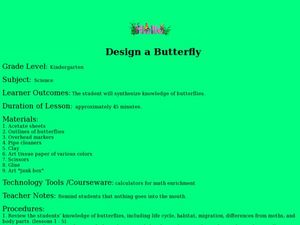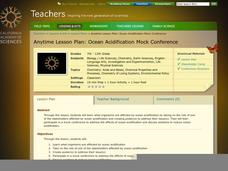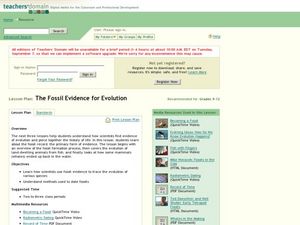Curated OER
Simple Machines IV - Levers
The principles of levers and simple machines are presented here. An easy-to-make lever is constructed by each group of scientists, and they use it to explore how this simple machine makes heavy things so much easier to lift and move. A...
Curated OER
An Internet Exploration: Flying into the Eye
Take a virtual field trip into the eye of a hurricane. Through a series of websites, mini-meteorologists discover the anatomy of a hurricane and how one is formed. Add some excitement to your atmosphere curriculum by exploring this form...
Curated OER
Surface Air Temperature Trends of the Caribbean
Students use real satellite data to determine the changes in near-surface air temperature at different times of the year over the Caribbean Sea. They discover how Earth's tilt causes seasonal differences in incoming solar energy. They...
Curated OER
What Is in the Water?
Learners compare bottled water qualities to water found naturally in a pond habitat. They research their state's laws/regulations in regard to bottled water and study the advertising, cost, and quality of brands of bottled water. They...
Curated OER
Quality Control at Kality Krunchers Dill Pickle Factory
In a hypothetical scenario, food chemists use titration to concoct a brine solution for producing the crunchiest pickles. They also analyze store-bought pickle juices. In addition to reinforcing titration techniques, the lesson requires...
Curated OER
When the Wind Blows Lesson Plan
Learners read a book and observe the wind and how it affects the environment. They explore what wind does by looking at pictures, reading a book, and by completing an experiment. They will use their own knowledge of the wind and compare...
Curated OER
The Impact
Learn about the destruction of the rainforest by analyzing statistics. Young learners make an original line graph showing destruction in the rainforest. Additional activities include making a collage, sequencing Dr. Seuss' The Lorax,...
Curated OER
Ecuadorian Rainforest
Have your class talk about the importance of the rainforest and the products that come from it. Learners watch a video showing the path of chocolate from the rainforest to the supermarket. They discuss how the rainforest and chocolate...
Curated OER
Design a Butterfly
Students access prior knowledge of butterflies. For this butterfly lesson, students create butterflies and compare and contrast their butterflies. Students describe the various body parts.
Curated OER
Exploring Arizona's Biotic Communities Lesson 4: Which Team Are You On?
Who is not drawn to trading cards? For this lesson, junior ecologists create a trading card of an animal or plant from one of Arizona's biotic communities. Gorgeous sample cards are provided in the lesson plan as well as a plethora of...
California Academy of Science
Ocean Acidification Mock Conference
In a comprehensive role playing activity, teens play the parts of different stakeholders in the realm of acidic oceans. They research, debate, and create a presentation from the perspective of either ocean organisms, the fishing...
California Academy of Science
Fish Prints
What do a dead fish, conservation, and paint have in common? The answer is a great lesson about fish anatomy, fun print making techniques, and unsustainable fishing practices. The class will start by making fish prints with a...
Curated OER
A Whale of Importance to the Arctic People
The bowhead whale of the Arctic region is of great importance to the people that live there. Your class will brainstorm all they know about this wonderful whale and create an informational video, which they will share with the children...
Forest Foundation
Forest Health
Young foresters examine the strategies, like prescribed burns and thinning, that are employed to ensure healthy forests.
Curated OER
Hatching Chickens
Young scholars observe chickens hatching in a classroom incubation environment In this egg-hatching lesson plan, students make observations of the hatching process and later care for the hatched chickens.
Curated OER
The Fossil Evidence for Evolution
High schoolers examine how scientists use fossil evidence to trace evolution of various species and methods used to date fossils.
PBS
Stories of Painkiller Addiction: Myth or Fact
Are opioids the most abused drug after marijuana? How hard is it for young people to obtain painkillers without a prescription? Middle and high schoolers explore the growing epidemic of opioid addiction with a lesson that prompts them to...
Perkins School for the Blind
Creating a 3-D Model of a Plant Life
Instructing blind or visually impaired learners means you need to make symbolic tactile representations of various processes to provide as much input as possible. But wouldn't it be even better to have your learners make the models...
PBS
Stories of Painkiller Addiction: The Cycle of Addiction
Drug addiction, including prescription drug addiction, begins with a reason that's different for every user. High schoolers learn more about the reasons people begin abusing drugs with a set of videos and worksheets that discuss four...
Curated OER
Fish Communities in the Hudson
Learning to read data tables is an important skill. Use this resource for your third, fourth, or fifth graders. Learners will will study tables of fish collection data to draw conclusions. The data is based on fish environments in the...
Other popular searches
- 4th Grade Life Science
- Life Science Inquiry
- Life Science Vertebrates
- Life Science Experiments
- K 2 Life Science
- Life Science on Cells
- Life Science Lesson Plans
- Grade 4 Life Science
- Life Science Report Topic
- Australia Life Science
- The Life Science
- Life Science Lessons





















